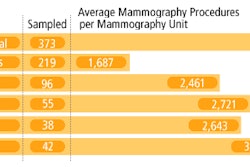Controversy over the benefit of screening mammography may heat up again following news that a panel of experts sponsored by the National Cancer Institute could not find sufficient evidence that it lowers breast cancer mortality.
The panel, called the PDQ (Physician Data Query) screening and prevention editorial board, reviewed findings Wednesday from the controversial meta-analysis published in the Lancet by Danish researchers Dr. Peter Gøtzsche and Ole Olsen (Lancet 2001, Vol. 358, pp. 284-1285,1340-1342).
The Danish researchers had concluded that, due to faulty randomization methods, most of the large studies of mammography do not support the efficacy of mammography for reducing mortality.
At the PDQ meeting, panelists agreed that seven large mammography studies had serious flaws that weakened or cast doubt on their validity, according to an article in Thursday's New York Times. The board also said that while it was possible the mammograms were beneficial, it was also possible that they were not, according to the article. These doubts applied to women of all ages, according to the board.
The PDQ screening and prevention editorial board is an independent panel consisting of experts both in and outside the National Cancer Institute, said NCI spokesman Mike Miller. The board, which is chaired by Donald Berry, chairman of the department of biostatistics at M. D. Anderson Cancer Center in Houston, includes representatives from oncology, cancer prevention, statistics, epidemiology, and economics, according to the NCI.
The board meets six times a year to evaluate cancer screening and prevention evidence. PDQ editorial boards maintain and update cancer information summaries on the NCI's Web site, but do not have the power to change NCI guidelines.
In its current summary of evidence on breast screening, the PDQ screening and prevention editorial board found that screening "initiated in the 40s reduces breast cancer mortality, an effect that can be identified about 10 to 12 years after the start of screening." Screening patients 50 to 69 years old "reduces breast cancer mortality, an effect that can be identified within several years after the start of screening."
The board hopes to publish revised information, including the new evidence, on the NCI's Web site by April, Miller said.
NCI guideline change?
While new evidence provided by the board would be considered by NCI, it's too soon to say whether the institute would change its mammography recommendations, Miller said. The NCI currently recommends screening mammograms for women over 40 every year or two.
"As to whether these doubts (about mammography's value) will manifest themselves in any type of change, that has yet to be seen," he said. "The NCI is supporting research to learn more about mammography, and wants to have as much evidence as possible before any change would take place. (Changing) guidelines is a deliberative and meticulous process that involves a lot of people in and outside of the government."
The PDQ board also recommended that others pursue a detailed, independent analysis of the mammography studies, according to the New York Times.
Some researchers don't believe a further review is necessary. Having previously studied the research of Gøtzsche and Olsen, the American Cancer Society found nothing that would lead it to question its or other researcher's conclusions on the value of mammography, said Robert Smith, Ph.D., director of cancer screening for the American Cancer Society.
"Mammography is beneficial for detecting cancers early, and early detection results in lower breast cancer mortality," Smith told AuntMinnie.com. "There's nothing in that analysis that would lead us to change the fundamental recommendations for routine screening."
In any event, the panel's discussion will likely renew the debate over the validity of the conclusions reached by the Danish researchers.
The PDQ board’s change of opinion is particularly disappointing, as it appears to be based on a weak paper that studied data existing prior to the most recent NCI consensus conference, said Dr. Etta Pisano, chief of breast imaging at the University of North Carolina School of Medicine in Chapel Hill.
"There is no such thing as a perfect clinical trial, and the trials selected in the Lancet paper as of the best quality were not judged that way universally; that is, by all experts," she said. "In particular, there were significant questions about randomization and image quality for the Canadian trial, one of the two studies represented in the Lancet paper as least flawed."
In addition, breast cancer mortality has declined in the U.S. and U.K. since the late 1980s, Pisano said.
"While some of the improvement is from improved therapies, some should also be attributed to increased screening," she said.
By Erik L. RidleyAuntMinnie.com staff writer
January 24, 2002
Related Reading
Danish mammographers exclude dissenting opinion, October 23, 2001
Reassessment confirms: Screening mammography has no survival benefit, October 19, 2001
Most women overestimate the efficacy of mammography, October 19, 2001
Swedish trials reiterate mammography’s effectiveness for most women, May 8, 2001
Danish mammo study reviewed: right questions, wrong answers, January 17, 2000
American Cancer Society blasts Danish mammography study, January 10, 2000
Copyright © 2002 AuntMinnie.com




















